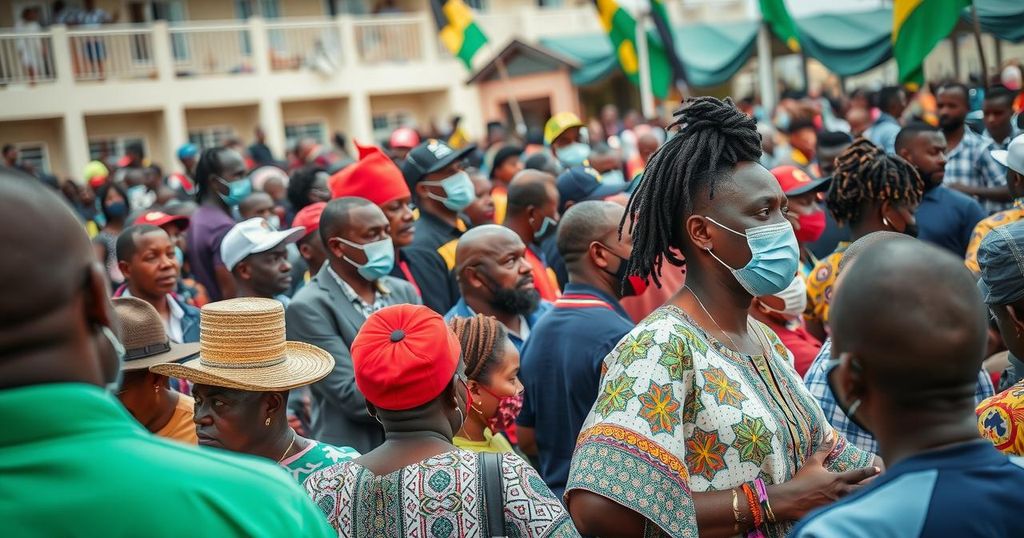Politics
ACCRA, AFRICA, AKUFO - ADDO, BAWUMIA, DEMOCRACY, ELECTION, ELECTORAL PROCESS, GHANA, GOVERNANCE, GOVERNMENT, INTERIOR MINISTRY, JAMES NSIAH, JAMESTOWN, JOHN MAHAMA, MAHAMUDU BAWUMIA, NANA AKUFO - ADDO, NATIONAL DEMOCRATIC CONGRESS, NDC, NORTH AMERICA, NPP, OPPOSITION, UNITED STATES, WEST AFRICA
Jamal Walker
0 Comments
Ghana Holds Crucial Presidential Election Amid Economic Challenges
Ghanaians voted in a closely contested presidential election on Saturday, with Vice President Mahamudu Bawumia and former President John Mahama as the main candidates. Economic recovery following severe financial crises emerged as a central issue. Results are expected soon, with citizens expressing a strong desire for change amid high inflation and stagnant employment.
On Saturday, Ghanaians participated in tightly contested presidential elections, with Vice President Mahamudu Bawumia and former President John Mahama as frontrunners. These elections were held amidst economic recovery hopes following Ghana’s most severe financial crisis in decades, characterized by a significant debt default. President Nana Akufo-Addo’s exit after his constitutionally mandated two terms has prompted this much-awaited electoral exercise, with both leading parties focusing their campaigns on the ailing economy that has plagued the country recently.
The electoral contest was underscored by rising inflation and economic distress following recent defaults, triggering negotiations for a $3 billion bailout from the International Monetary Fund (IMF). By 1700 GMT on Saturday, polling concluded, with early results anticipated by Sunday and full presidential election results expected by Tuesday. As voters expressed their desire for change due to the harsh economic climate, retired police officer James Nsiah noted, “We want to vote for change; the economic situation is very hard.”
Ghana’s historical political stability has seen the same two parties—the ruling New Patriotic Party (NPP) and the National Democratic Congress (NDC)—alternate in power since 1992. Currently, the NPP’s slogan “Break the 8” symbolizes their ambition for a third consecutive term led by Bawumia. However, linking him to criticisms of President Akufo-Addo’s administration poses a challenge for his campaign. Bawumia voted early and remained optimistic about electoral outcomes, asserting, “I am very hopeful of winning this election. I think we have done a lot of work… and the message has been well received.”
The government implemented temporary land border closures to maintain electoral integrity. Inflation has shown signs of decline—from over 50 percent to approximately 23 percent—but citizens still face challenges with high living costs and unemployment. Opposing candidate Mahama aims to revolutionize the economy and is proposing a “24-hour economy” to boost job creation, though his previous tenure has made him a controversial figure. First-time voter Abdullah Mohammed expressed neutrality toward both candidates, emphasizing the need for effective leadership amid economic uncertainty.
Illegal mining practices also emerged as significant concerns during the campaign, as their detrimental impact on the environment and economic resources, such as cacao production, persists despite previous governmental promises to curtail it. The outcome of this election will be pivotal, not only determining leadership but also dictating Ghana’s economic recovery path in the face of challenges.
As Ghanaian voters cast their ballots in this crucial election, the anticipation of change is palpable, reflecting a nation yearning for political leadership that can navigate economic challenges successfully, particularly in light of the recent financial turmoil and pressures from constituents seeking improvement in their daily lives.
Ghana is notable for being the world’s second-largest producer of cocoa and a significant exporter of gold. However, it has recently faced considerable economic hardships, including a major debt default and soaring inflation rates, which have greatly affected the populace. The political landscape in Ghana since 1992 has been characterized by regular power transitions between the two dominant parties, the NPP and NDC, often centered on economic performance and stability. As President Akufo-Addo prepares to vacate his position, the country is looking to its next leader to steer it through these turbulent economic waters, making this election not only a routine political process but a critical juncture for national recovery.
The presidential election in Ghana encapsulates the struggles and aspirations of its citizens amid economic hardship. With key issues such as inflation, unemployment, and illegal mining at the forefront, voters are seeking a leader capable of fostering economic stability and growth. Both Mahamudu Bawumia and John Mahama present differing visions for the future, yet the desire for transformation remains a common thread among the electorate. As results are awaited, the implications of this election will resonate throughout Ghana, potentially setting the course for its economic revival.
Original Source: www.france24.com




Post Comment